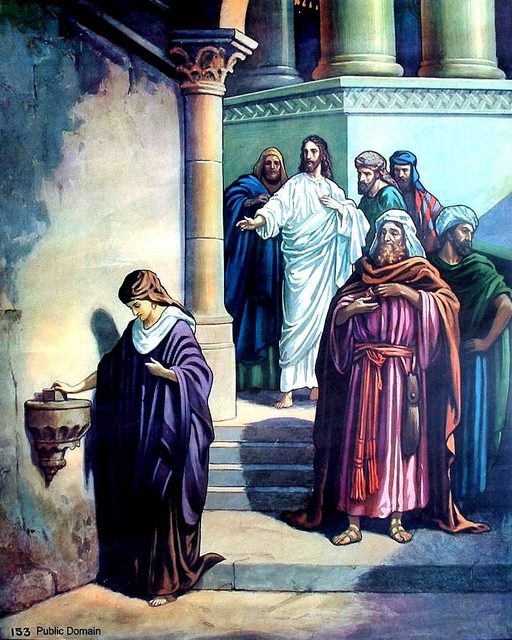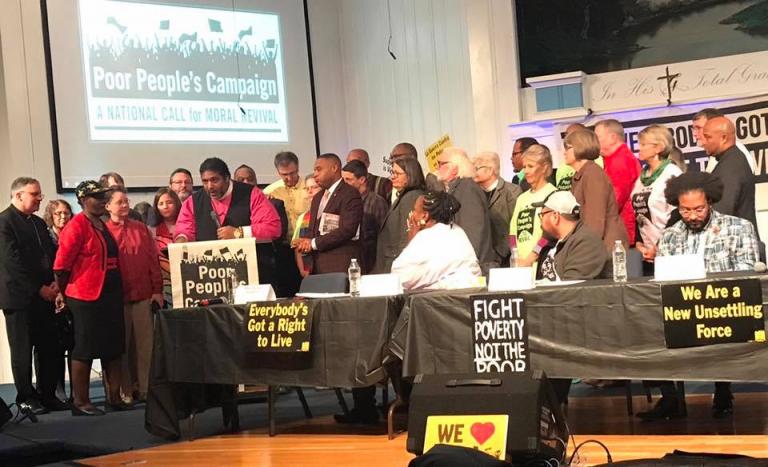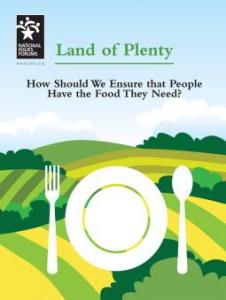It’s time to rethink the story about ‘the widow’s mite’ in Mark 12:41-44 and Luke 21:1-4. The widow is not meant to be an object lesson for our stewardship sermons.
[I preached this sermon at St. Thomas Lutheran Church in Richmond, Kentucky, on November 11, 2018, the Sunday after the midterm elections.]
This parable in the Gospel of Mark is often called “The Widow’s Mite.” Because a mite is just a wee small bit. Historically, a mite was a small copper coin worth about a penny.

I often hear preachers use this parable as the basis for a stewardship sermon.
Their logic goes something like this: It doesn’t matter if you can’t give as much to the offering plate as the rich woman or man. What matters is that you give what you can, even if it’s nothing more than the widow’s mite.
They point to Jesus’ words: “Truly I tell you, this poor widow has put in more than all those who are contributing to the treasury. For all of them have contributed out of their abundance; but she out of her poverty has put in everything she had, all she had to live on.” (Mark 12:43-44)
We read this as if Jesus is valorizing poverty.
As if Jesus is glorifying the selfless giving of this poor widow in order to shame the rich into giving more. If that’s really what this story is about, then the widow becomes nothing more than an object lesson in what’s called “proportional giving.”
Proportional giving logic works like this. Say a person has $100,000 and they give $1000 to the offering. That’s a lot, right? But proportionally, they are only giving 1%. Whereas the widow had only two copper coins, and she gave them all. It’s simple math – which is proportionally bigger, 1% or 100%?
I have to admit, I’ve been guilty of using the widow’s mite this way in my preaching and teaching.
But here’s the problem. Are the poor supposed to feel better about themselves because “they gave all they had”? Do we think that the rich will be shamed into giving more? Not likely. Instead, the rich harumpf away grumbling, “Yes, but you better believe if I took away that $1000 – this church would fall to ruin.”
And nothing changes. The poor are still poor, the rich are still rich, and the preacher is still asking for money to pay the light bill.
So maybe this passage isn’t the best choice for a stewardship sermon after all. Actually, it’s not intended to be a story about stewardship at all. Focusing on the widow’s generosity ignores or leaves out the verses just prior to the her offering. In Mark 12:38 – 40, Jesus says this:
“Beware of the scribes, who like to walk around in long robes, and to be greeted with respect in the marketplaces, and to have the best seats in the synagogues and places of honor at banquets! They devour widows’ houses and for the sake of appearance say long prayers. They will receive the greater condemnation.”
Ouch. He’s right. And speaking of widows, here comes one now.

Jesus draws attention to the one person no one is noticing. Yes, she gives all she has. But it isn’t right that such a system exists where she “has been taught and encouraged by religious leaders to donate as she does. . . Jesus condemns the value system that motivates her action, and he condemns the people who conditioned her to do it.” (Addison G. Wright, SS, “The Widow’s Mites: Praise or Lament? – A Matter of Context’, CBQ 44 (1982), 262, in A Feminist Companion to Mark, ed. Amy-Jill Levine (Cleveland: Pilgrim Press, 2001).
I used to minister to a widow who was taken in by religious leaders who did this very thing.
She would watch the televangelists who looked into the camera – right into her living room – and told her that if she gave all she had, God would bless her. So every time her Social Security check came, she would write out checks to these televangelists and give them all she had. While she lived in a trailer park barely subsisting in her poverty, the well-dressed women and men on the screen took her money and bought their mansions and their fancy cars and their private jets. And in return she received her “blessing”: a cheap “certificate” touting her as a supporter of their so-called ministry.
Yes, that’s an extreme example.
But even mainline churches can be guilty of pressuring people for money who can barely afford to pay their utility bills and buy groceries.
I’m reminded of something that The Rev. Dr. William Barber said to us clergy at a church in Lexington, Ky., a few days before the midterm elections.

It was a gathering of people for the Poor People’s Campaign: A National Call for a Moral Revival, and we were there to listen to the stories of people who have been affected by the policies and systems in this country that commit economic violence against the poor. But Dr. Barber didn’t let the clergy leaders off the hook. He said this:
“It is the height of hypocrisy for a pastor, an imam, or a rabbi to ask your people to give an offering and you’re not out there in the street fighting for them to have a living wage.”
Ouch. He’s right. How can we expect folks to give to the Lord if we’re not asking our legislators to raise the minimum wage above the pitiful rate of $7.25 an hour so that they can give an offering without cutting into the bone of their finances? Here in Kentucky, do you know how many hours a minimum wage employee would have to work a week just to afford an average 2-bedroom apartment? 77 hours! No, I didn’t say 40 hours. I said 77 hours. It’s no wonder people sometimes work 2 or 3 jobs just to make ends meet. And do you know how many workers make under $15 an hour in this state? 872,000 – half of Kentucky’s workforce!
As we said that night at the PPC:
“Somebody’s been hurting my people, and it’s gone on far too long! And we won’t be silent anymore!”
When I hear stories about the widows and others in poverty who are take advantage of by those in power, or simply written out of the story by the system, it makes me frustrated and, frankly, angry. It’s not fair, it’s not right, and God doesn’t like it very much. And, to tell the truth, neither do the widows.
In my mind’s eye, I see this widow come up to the temple not as some meek, humble wallflower gingerly placing her two copper coins in the treasury. No, I see her with her head held high, her shoulders squared, and her jaw set. I see defiance in her eyes. I pull a chair up next to Jesus and I watch this woman slam down her two coins.
“You see this? It’s all I have left. You’ve taken everything from me. You drove my husband into debt by hiking up the taxes on our land. You polluted our water and air with your cancer-causing industries, and now he’s dead. You’ve forced me out of my house because I couldn’t pay off the debt. You took away my health insurance. You cut my Medicare and Social Security. You’ve priced my medications beyond what I can pay. And you’ve told me that I should be thankful because this is all God’s will. You religious and political leaders are here because God put you there – that’s what you’re saying. So I should give all I have in order to receive God’s blessings. Well here it is – two copper coins. You already have everything else. You might as well take this, too.”
Perhaps this story should really be called the widows’ MIGHT.
Because when the widows band together, they have a strength and a power that comes from God. Remember, it’s the persistent widow in Luke’s gospel who has the tenacity – and faith – to pester the judge until she gets justice. It’s the widow of Zarephath who has the tenacity – and faith – to feed her family and the prophet Elijah until the drought ends.
In all of these stories, there are intense political divides between religious leaders, political leaders, and different tribes – just like there are today. The midterm elections this past week showed us exactly how stark the political divide is in this country. But exacerbating all these divides in scripture as well as in our time is the disparity between those who control the community’s wealth and those who do not.
Economic violence is the problem undergirding many of our political tensions.
And here’s the thing. Regardless of the results of the midterm elections, the rich are still parading in their robes. The widows remain. They still have only a jar of flour and a jug of oil. They still have only two coins. And Jesus is still watching. When everyone else is distracted by the big goings-on among the power-brokers, it’s Jesus who points out the widow. It’s Jesus who draws attention to a system that leads to this level of destitution and desperation – even as she tries to be faithful.
In the midst of our political struggles, God puts the widows front and center.
The ones who are poor, who have no social safety net, who are cast aside by economic systems that prey on them – even as their leaders parade about in rich clothing. So no matter how these midterm elections turned out, God is still calling us to pay attention to the poor, the lost, the forgotten, the disenfranchised, the victims of economic violence.
And this church is going to do just that.
Last week, we had a discussion after worship about how we might respond to the deep divides in this country. Recall that the text last Sunday was about Jesus raising Lazarus. I invited the congregation to talk about what has people bound in the tomb, so to speak, and how we as a church might unbind them and let them go, knowing that Jesus has already performed the miracle of new life.
So after the service, we talked about how the ministry of this church can be part of Jesus ministry of release from the shrouds of death. As we talked, many people pointed to the food pantry as an important ministry already in place in this church. But we wrestled with the question – why is it that people have need of the food pantry in the first place? What are the conditions in our society that result in hunger for so many in this community?

We decided that in January we’ll engage in a deliberative dialogue about this topic. We’re going to use materials from the National Issues Forum Institute, which is a nonpartisan nonprofit organization that develops materials for communities to engage in dialogue about complex social issues. Starting in the new year, we’re going to work with their issue guide called “Land of Plenty: How Should We Ensure that People Have the Food They Need?” And we’re going to see how the Holy Spirit works with us and through us to discern how this church might do more to address the issues that lead to hunger in the first place.
I don’t know where this conversation might lead. But I do know this.
God listens to the widows – the poorest of the poor – loud and clear.
The Bible talks about justice for widows over 100 times. Twenty-five books of the Bible contain either instructions or stories about widows. And they’re all very clear – if you really want God’s blessings, you better be on the side of the widow. Elijah found that out. It was the widow who fed him. And remember, God talked to that widow before Elijah even walked into town. The widows, the victims of economic violence – they are the ones we need to listen to.
These women aren’t messing around.
They’ve been to hell and back. They’ve had to find strength when death and society and systems have tried to take that strength away. And they have God on their side. The widows are not backing down. They’re rising up. They’re demanding justice. The widows’ MIGHT has a faith at its core that will not be moved.
I don’t know about you. But I’m standing with the widows.
Amen.

Leah D. Schade is the Assistant Professor of Preaching and Worship at Lexington Theological Seminary (Kentucky) and author of the book Creation-Crisis Preaching: Ecology, Theology, and the Pulpit (Chalice Press, 2015). She is an ordained minister in the Lutheran Church (ELCA).
Twitter: @LeahSchade
Facebook: https://www.facebook.com/LeahDSchade/.
Read also:
It’s Time to Vote and THUNDER at the Polls: Rev. Dr. William Barber Visits Kentucky
We Intend to Be Heard: Poor People’s Campaign Denied Access in Kentucky
How to be a Christian (and a Pastor) After the Midterm Elections













